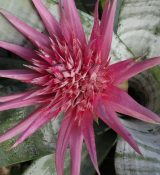Bromeliads Shouldn’t be Blamed for Zika Spread
Author: Celeste Booth12 Comments
Care and Culture, Growing Outdoors, Insects

With the recent spread of the Zika virus, which is mostly transmitted by the Aedes mosquito species, bromeliads have become the focus of blame in South Florida. Because the water tank of a bromeliad can be used as breeding ground for mosquitoes, bromeliads have found themselves under the spotlight as being a major contributor of the Zika-spreading mosquitoes.
While the reasoning of this blame comes from a good place, we cannot be so quick to condemn these plants. Let’s take a quick look at what we know, and how we can safely eliminate or reduce the mosquito’s breeding chances.
What We Know
Health officials in Florida have ripped out thousands of bromeliads from public parks and spaces, and have recommended homeowners do the same. Unfortunately, this safety measure comes with little science to back it up. While it is true that the water tank of bromeliads provides a nice place to reproduce, it is most significantly the Wyeomyia species of mosquito (a species that does not carry Zika) that has been found to breed in bromeliads. There is no research that suggests that the Aedes aegypti mosquito hangs around or breeds in bromeliads in droves.
While “better safe than sorry” is often a good rule of thumb, it might not justify the massive effort to rip out each and every bromeliad. In fact, Florida benefits from over $35 million in bromeliad sales annually. Some are worried about the repercussions of eliminating all these plants due to a similar situation that occurred less than 10 years ago. In an attempt to abolish the spread of a certain bacterial disease, authorities made the decision to remove hundreds of thousands of citrus trees. Many trees cut out were healthy and their disposal had a measurable negative impact on the economy in that particular area.
How to Safely Continue to Grow Bromeliads
With a little attention and effort, you can reduce or nearly eliminate the use of bromeliads as breeding grounds for mosquitoes — of any species. Regularly flushing the bromeliad tank will prevent stagnant water which appeals to insects looking for a place to lay their eggs. Using a bacterial larvicide, such as mosquito dunks, will also create an unfavorable environment for mosquitoes. Finally, remove spent leaves and dead blooms and keep the general area clean and free of excess materials.
Caution, but not Eradication
There are two areas in Florida that have tested positive for active (non-travel) Zika transmission: Miami Beach and the Wywood Arts District. As a precaution, all bromeliads have been ripped out of these areas. However, other counties with no reports of Zika have begun removing bromeliads as a cautionary measure as well. While the urge to do something (even removing hundreds of healthy plants) might seem like the right move under the view of a critical public eye, this effort will likely not help contain the spread of Zika. In fact, it may instead contribute to bromeliads being stigmatized and rashly eliminated. Until/unless bromeliads are shown to be a major contributor to the spread of Zika, eradicating bromeliads may be more damaging to the plants and horticulture industry itself. Proper care and plant maintenance will allow bromeliads to continue to flourish in Florida without being branded with a bad name. Rather than blatantly blame bromeliads, let’s help the public understand it’s not bromeliads we should fear, but the improper maintenance of any plants or unattended pools of water.
Source
USDA Census of Agriculture
12 Responses to “Bromeliads Shouldn’t be Blamed for Zika Spread”
Leave a Reply

Resource Download
Hechtia Care Cheat Sheet
Learn how to care for your Hechtia bromeliad with this quick and easy informational guide.
Learn More
Ask an Expert
Questions about bromeliads?
Our experts love a challenge!
Photo of the Week
Submit your photo to be featured on the blog!
More Photo of the Week Winners
Submit Photo








I am a master gardener who educated about bromeliads they are my yard not grass!
Wonderful, happy to have you here Jan.
Typical liberalism at work…act superficially without thought of the consequences. I’m sure those same bromeliad haters that act rashly without adequate scientific data believe the man-made global climate change “science” is perfectly fine regardless of the fact that global warming theory is based totally on computer models that haven’t been proven out in reality. In the 70’s it was the global cooling scare, then the global warming scare, now it is just called climate change because that is one thing that will happen no matter what. I guess Bromeliads are now going to be responsible for all Zika cases moving forward when in reality Florida is covered in water and wetlands and always has been. I would bet Bromeliads represent one tenth of one percent of mosquito breeding grounds if even that much. Guess we better drain more than just the Washington D.C. swamp! Not to mention those so quick to hate on plants probably have all kinds of “water holding” buckets, cans, and objects in their own yards! How about we just start an awareness campaign on that issue before destroying plants!
Thank you for your comments. A little more awareness would surely go a long way! Hopefully this article helped shed a bit more light on the topic.
Thank you for this informative report
You’re very welcome.
Great article! Lets use good sense before our emotions take over. Science is great but youmust combine it with common sense.
Yes, thank you!
Hmm, it says “no comments” posted but clearly I posted one several days ago. I wonder why it was censored? I guess pointing out the hypocrisies of those on the LEFT in combination of how that affects Bromeliads in this instance was just too much for you snowflakes to handle. Take me off your mailing list please.
Hi Chris, all comments await moderation before approval to avoid spam. Yours and several others are already published above on the site. If you are having any issues viewing them, please let us know and we’d be happy to look into it further.
Do heliconia flowers do the same?. Bromeloids grow wild in the forests in Domincica. Whats a task it would be to eradicate them there and the effects on the food chain.
Was the study of mosquito larvae in bromeliads large enough to be definitive in convincing local authorities to stop removing bromeliads? I live in Brevard County and would love to have a copy of any studies done since Zima has been detected here also. I love my bromeliads.